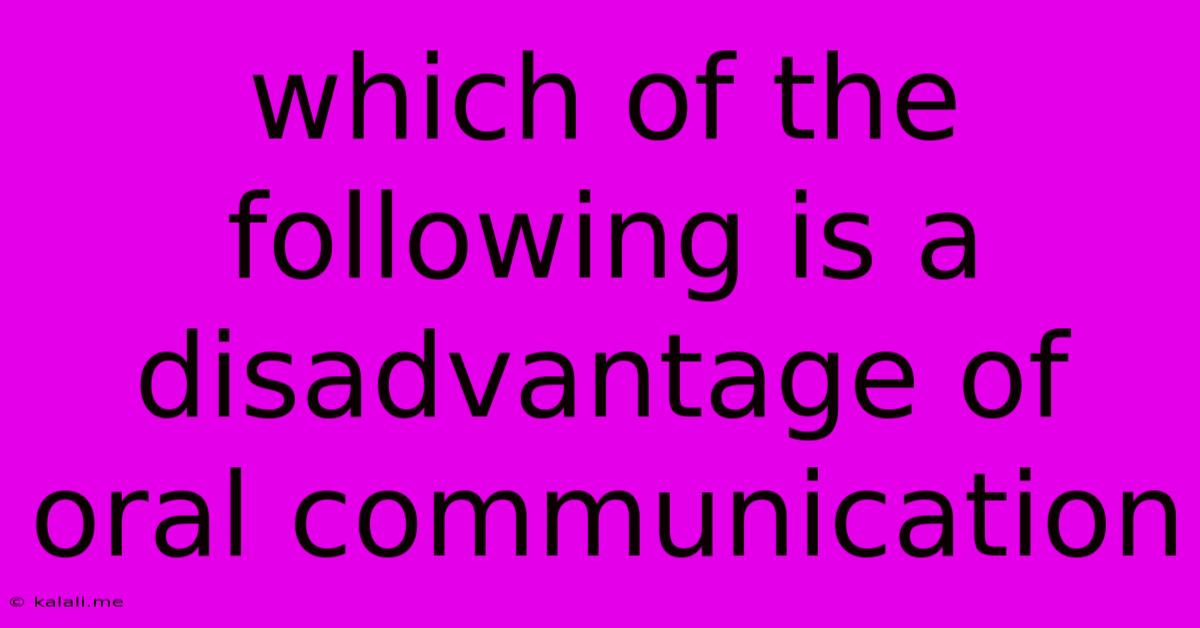Which Of The Following Is A Disadvantage Of Oral Communication
Kalali
Jun 16, 2025 · 3 min read

Table of Contents
Disadvantages of Oral Communication: Why Written Word Still Matters
Oral communication, while a cornerstone of human interaction, isn't without its drawbacks. While it fosters immediate feedback and builds rapport, several significant disadvantages can hinder effective communication and lead to misunderstandings. This article explores the key downsides of relying solely on oral communication, highlighting situations where written communication might be more suitable. Understanding these limitations helps you choose the most appropriate communication method for different scenarios.
Oral communication, while effective in many situations, presents several challenges. These challenges can range from simple misunderstandings to significant communication breakdowns impacting projects, relationships, and more. Let's delve into some of the most critical disadvantages.
1. Lack of Documentation and Record Keeping
One of the most significant disadvantages of oral communication is the absence of a permanent record. Unlike written communication, verbal exchanges aren't easily documented. This lack of documentation can lead to confusion and discrepancies, especially in complex discussions or when important decisions are made. Without a written record, recalling specific details or resolving disputes becomes significantly more difficult. This is particularly problematic in professional settings where accountability and transparency are crucial. Think about project updates, meeting minutes, or critical performance reviews; written documentation is paramount.
2. Time Constraints and Scheduling Difficulties
Scheduling a time for oral communication can be challenging. It requires coordinating the availability of all participants, potentially leading to delays and disruptions. Unlike written communication, which can be consumed at the recipient's convenience, oral communication demands everyone's immediate attention. This can be particularly difficult in geographically dispersed teams or when dealing with busy individuals. Email, instant messaging, or memos offer a more flexible alternative in such scenarios.
3. Potential for Misinterpretation and Misunderstanding
Oral communication relies heavily on tone, inflection, and nonverbal cues. These subtle elements can easily be misconstrued or missed, leading to misunderstandings. Cultural differences, accents, and background noise can further complicate the process. In contrast, written communication offers clarity, allowing individuals to reread and clarify ambiguous points before responding.
4. Limited Reach and Accessibility
Oral communication is inherently limited by its reach. It's difficult to convey information to a large audience simultaneously without the use of technology like webinars or video conferencing. Even then, technical issues can impede effective delivery. Written communication, on the other hand, can reach a significantly wider audience easily and cost-effectively through emails, newsletters, or online publications.
5. Difficulty in Conveying Complex Information
Complex or detailed information is often better suited to written communication. Oral communication, while effective for simple messages, can become overwhelming when dealing with intricate details, technical specifications, or lengthy explanations. Written communication provides the opportunity for a more structured and organized presentation of complex data, allowing the recipient to process it at their own pace.
6. Lack of Time for Deliberation and Thoughtful Response
Oral communication often demands an immediate response. This can lead to impulsive decisions or poorly considered answers. Written communication allows for careful consideration, research, and a more thoughtful response. This is particularly important in situations requiring critical analysis or in-depth consideration.
In conclusion, while oral communication plays a vital role in interpersonal interactions, acknowledging its limitations is key to effective communication. Understanding the disadvantages of relying solely on oral communication allows you to choose the most appropriate communication method for specific situations, optimizing clarity, efficiency, and understanding. Utilizing a combination of oral and written communication strategies often yields the best results.
Latest Posts
Latest Posts
-
How To Create Clickable Image In Html
Jun 16, 2025
-
What Are The Factors Of 121
Jun 16, 2025
-
What Is A Theme Of The Passage
Jun 16, 2025
-
A Company That Provides Access To The Internet
Jun 16, 2025
-
Which Word Is Closest In Meaning To The Underlined Word
Jun 16, 2025
Related Post
Thank you for visiting our website which covers about Which Of The Following Is A Disadvantage Of Oral Communication . We hope the information provided has been useful to you. Feel free to contact us if you have any questions or need further assistance. See you next time and don't miss to bookmark.